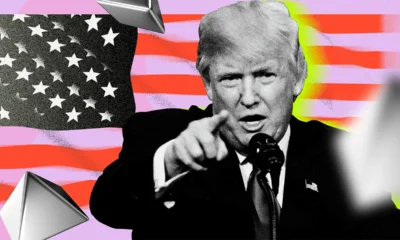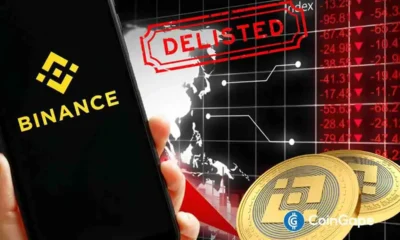Regulation
Russia Plans To Launch 2 Crypto Exchanges & BRICS Stablecoin

Russia is now planning to launch two crypto exchanges, one in Moscow and the other in St. Petersburg. This move underscores the need to boost foreign economic activity (FEA), Moreover, it aims to build an RMB-linked BRICS stablecoin.
The crypto exchange initiative is designed to provide a new platform for digital transactions. However, experts have expressed concerns over the potential limitations and risks associated with the project, particularly in light of international sanctions.
Russia’s Plans On Developing The Crypto Sector
One of the crypto exchanges will likely leverage the infrastructure of the St. Petersburg Currency Exchange (SPCE) to facilitate foreign economic activity, according to a report by Kommersant. Whilst, the other platform is expected to be based in Moscow. However, it remains unclear whether it will be developed on the foundation of the existing Moscow Exchange or as a separate entity within an experimental legal framework.
The primary focus of these exchanges will be the creation and use of stablecoins. For context, stablecoins are a type of crypto that is typically pegged to a reserve of assets, such as a national currency or a basket of currencies. In this case, the Russian government is reportedly considering the development of stablecoins linked to the Chinese Renminbi (RMB) Yuan and the BRICS currency basket.
Hence, this move is aimed at boosting economic cooperation among the BRICS nations (Brazil, Russia, India, China, and South Africa). Currently, BRICS is eyeing dedollarization via crypto and blockchain. However, the development and deployment of a BRICS stablecoin via newly-launched crypto exchanges present a number of challenges.
Oleg Ogienko, CEO of BitRiver, pointed out the technological difficulties in integrating stablecoins into Russia’s blockchain infrastructure. He noted that “stablecoins, due to their legal nature, are more like cryptocurrency.” This could complicate their convertibility, liquidity, and security. Moreover, the complexity of these issues could hinder the seamless adoption of stablecoins in Russia.
Current Regulatory Framework & Challenges For Crypto Exchanges
In terms of regulatory frameworks, Russia currently operates under Federal Law No. 259 “On Digital Financial Assets.” This regulation provides the legal basis for the issuance and circulation of digital assets. However, this legislation does not specifically address the creation or regulation of cryptocurrency exchanges.
Yaroslav Schitzle from law firm Rustam Kurmaev and Partners emphasized the lack of a “clear and unified legal mechanism for the creation and operation of crypto exchanges” under existing Russian regulation. The only relevant regulation available is the Experimental Legal Regime (EPR). This legislation was recently enacted and might serve as the legal foundation for these new cryptocurrency exchanges.
The introduction of these crypto exchanges is expected to be rolled out in stages. Initially, access will be restricted to a select group of users. These include subsidiaries of major exporters and importers, often referred to as “blue chips” in the business world.
Mikhail Uspensky, a member of the expert council on the legislative regulation of cryptocurrencies in the State Duma, weighed in on the matter. He noted it is unlikely that small and medium-sized businesses or individual users will be granted unrestricted access in the early phases. Moreover, he emphasized that “the contours of the future experiment are entirely at the mercy of the regulator.”
Implications Of Global Sanctions
Despite the potential benefits, the project is fraught with significant risks, particularly concerning sanctions. The transparency of blockchain technology could lead to severe consequences if transaction data were to be leaked.
Uspensky warned that if it becomes known that a cryptocurrency was purchased on a Russian exchange, this information could be tracked and flagged as suspicious. This could lead to the blocking of transactions. He cautioned that such a scenario could “significantly ruin the lives” of the participants in these transactions.
Furthermore, it could also affect future holders of these digital assets who may have no direct connection to Russia. Additionally, experts like Nikita Vassev, founder of TerraCrypto, expressed skepticism about the appeal of these domestic platforms.
He argued that “only those who have no other choice will use such an exchange.” Vassev suggested that established, internationally recognized trading platforms will remain the preferred choice for most users unless they are left with no alternatives.
Meanwhile, Russia’s BRICS peer, India, is looking forward to kickstart crypto regulatory efforts. The Indian government is seeking public opinion for better framework. Now, the DEA release is awaited in September-October period, which will lay the basis for digital asset regulation in the country.
Disclaimer: The presented content may include the personal opinion of the author and is subject to market condition. Do your market research before investing in cryptocurrencies. The author or the publication does not hold any responsibility for your personal financial loss.














✓ Share: